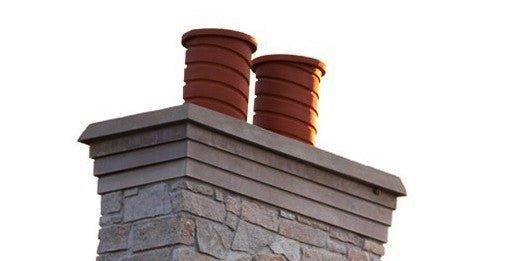Stay Classic or go Medieval with a little Pot on Top
A chimney pot is a round or octagonal pot fitted to the top of each flue. These chimney pots give your chimney a Tudor and or Medieval look.
Decorative Flue Tile Creates a Custom Looking Chimney
Decorative flue tiles adds more aesthetic appeal to your chimney. Designed to add style and creativity to any fireplace chimney. Decorative flue tiles can replace traditional flue tiles adding a new focal point to your home. Ask the experts at Chimney Cricket to help select decorative flue tiles that fit your chimney and home's décor.
Selecting Chimney Pots
When selecting a chimney pot that will function properly, it is important to consider the top opening in relation to the fireplace opening. Along with the base dimensions in relation to the flue they are covering. The top opening should be in proportion to the fireplace opening. The chimney pot opening is often smaller than the effective area of the flue liner in order to reduce the effect of wind draft. The flue area is typically about 1/10 of the fireplace opening for square flues and about 1/12 for round flues. For chimney pots, this ratio is often reduced to 1/15 – 1/20. The base inside dimension and the base outside dimension should be nearly as large as or larger than the largest dimension of the flue they are being installed on. The base of the chimney pot should not encroach on the effective area of the flue by more than ¾ of an inch. Many other factors such as fireplace chimney construction and house air pressure can affect proper chimney operation.
Installing Chimney Pots
Chimney pots are set in a bed or mortar on the masonry chimney cap. The base of the chimney pot need not match the dimensions of the flue liner that it’s being installed on top of. But it should not impinge on the inside area of the flue liner except for the maximum ¾ of an inch at the corners. The flue liner may extend up inside the chimney pot, or the flue liner may be flush with the top surface of the chimney cap. Additional anchoring may be used to prevent damage from tornadoes, hurricanes or earthquakes. A ¼ - ½ inch diameter hole may be drilled in at least two opposite sides of the chimney pot and a bar used to anchor the top into the grout or the chimney walls. When installing on wood chase chimneys, special attention should be given to preventing water leakage around the base of the chimney pot.

